#storytellers et al
Text
Sits around and thinks about classpects and sonas before i fall asleep yet again
#thinks abt how im a derse/light player and i also love vampires and wizards#and i also dress thematically opposite to my aspect bc im derse bound#also thinks abt how im derse bound and id totally just#make the midnight crew happen in my session purely cus im a witch of light and i love the mc gang#thinks abt how loose classpects are#and i think narratively. some combos must not exist if you were truly a homestuck character#bc of how the story uses classpects as ''under the hood'' mechanics for storytelling#but u guess it has more to do with how much symbolism can you draw from it and how does it work in ur group et al
2 notes
·
View notes
Text
the "labru chapter" is the kabru chapter
this is a dungeon meshi love manifesto, but not in the way you think. sorry not sorry for the labrubait
what makes chapter 76 so amazing is kabru’s desperation has little to do with laios specifically. it’s not just about kabru being obsessed with laios and making sure he doesn't cause tragedy, either. I think this chapter emphasizes kabru's struggle with the concept of love and companionship. the point of this chapter is that every critical part of kabru collides at once and renders him useless.
(disclaimer: this post includes a lot of projection/speculation but it's to understand kabru's character arc i promise. for clearer analysis and examination of how kabru's ideologies are constructed, check out this really great post)
kabru is a lone visionary
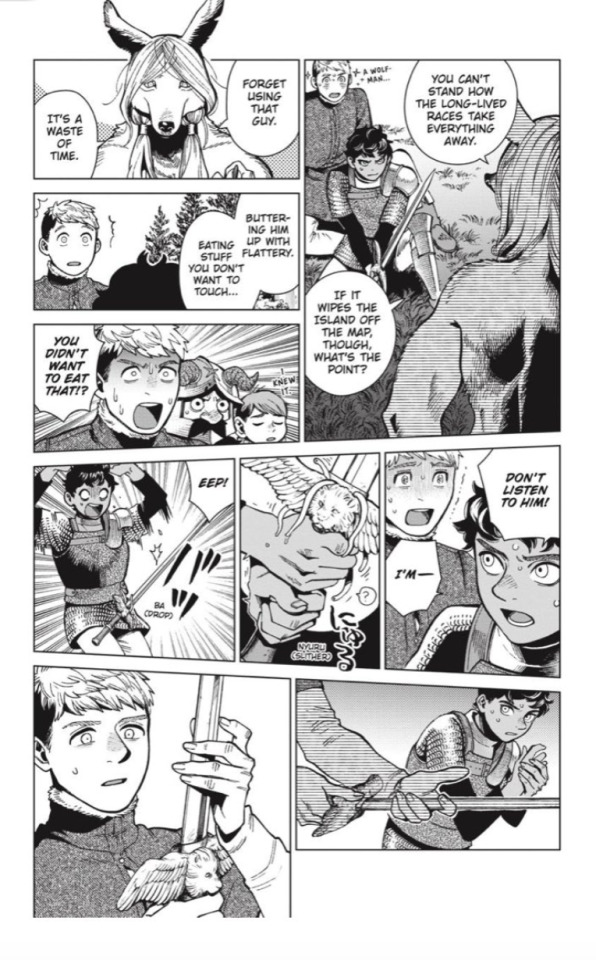
in ch 76, kabru’s threatened by lycion exposing his true intentions to laios not only bc he wants to prevent laios from joining marcille in her destruction, but also bc laios is also from a short-lived race and kabru needs an ally in his power struggle against elves (esp when the chips are down)
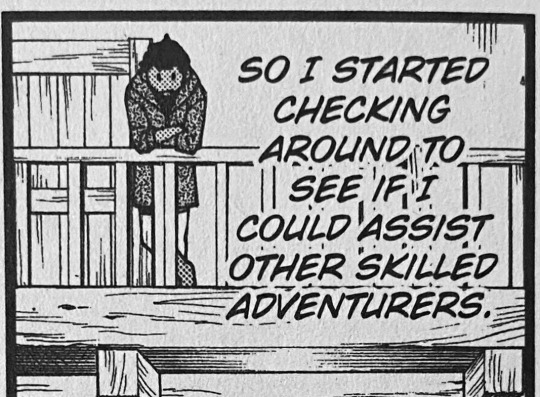
but has kabru really accepted his need for allies in his plight? kabru has spent his adult life suppressing a human urge to connect meaningfully with others. he even keeps rinsha et al. at arm's length in the name of achieving his masculine hero complex/survivor's guilt goals. he's already quite disillusioned bc most adventurers don't have the same goal as he does. so he uses people and gets on their good side for systematic support. he’s well-intentioned and takes care of his party. but the idea that an ally could also protect HIM and make HIM feel safe as well doesn’t really register with him until later on in the narrative bc camaraderie and allyship, at its core, is about acknowledging intimacy. kabru struggles with intimacy sub-textually (his self-neglect and social insincerity) even though he knows how to simulate it to gain others' trust.
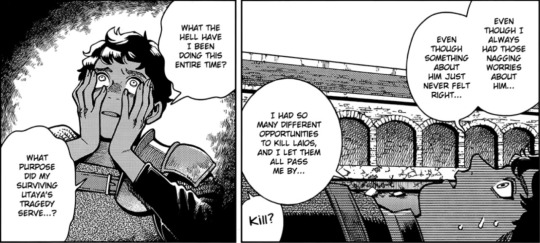
but he can’t crack laios, he can’t get him to listen. for lack of a better word, kabru is spoiled by the fruits of his superb perception and emotional intelligence. he also doesn’t cope well with failure (bc his goal is too valuable to ~not~ devote himself to) he puts too much value in conquering laios and when he thinks he's failed, he basically crashes out. the real problem is he still doesn’t understand his true feelings--not feelings for laios, but the root of his desire. the root of his goals and the endless search for companionship.
kabru is a strategic historian
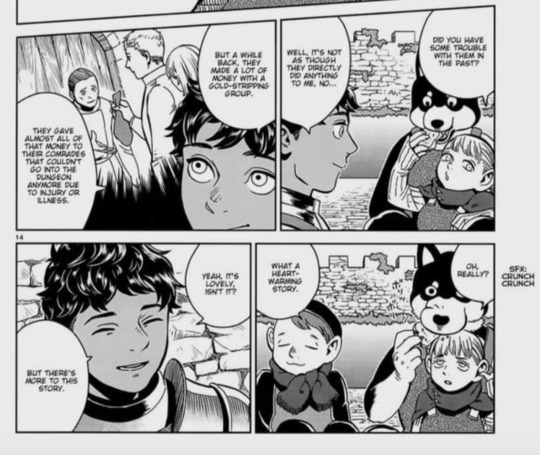
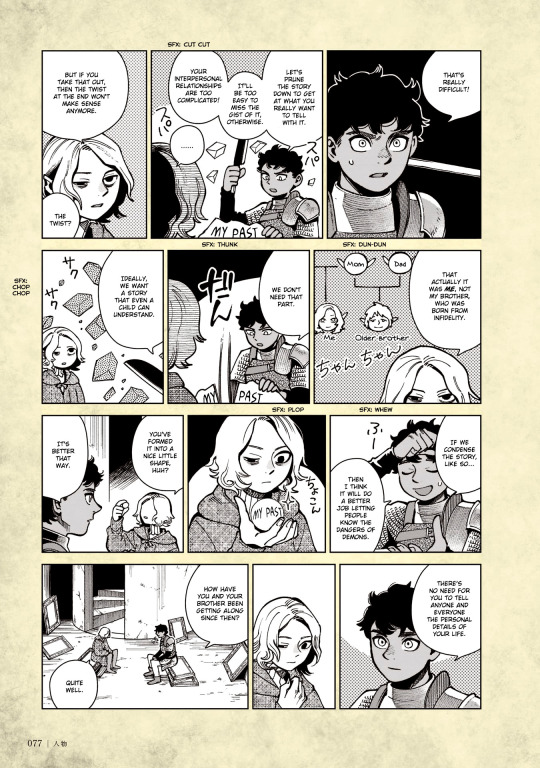
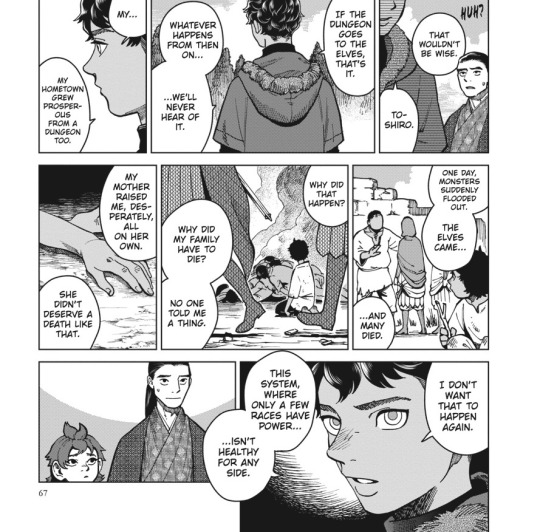
at his core, kabru is a storyteller. he tells himself a variety of stories about his trauma and his goals, which serve as motivation and to some extent, self-protection (as shown in his conversation w mithrun). he deeply understands the role of storytelling in regards to the construction of history and drastic shifts in power.
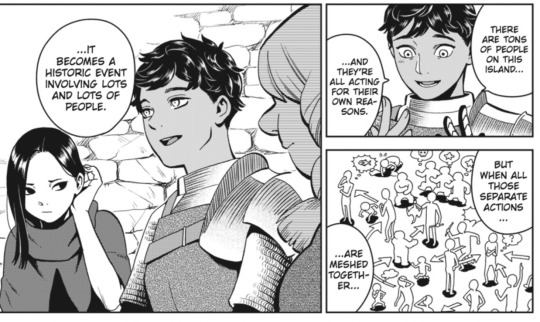
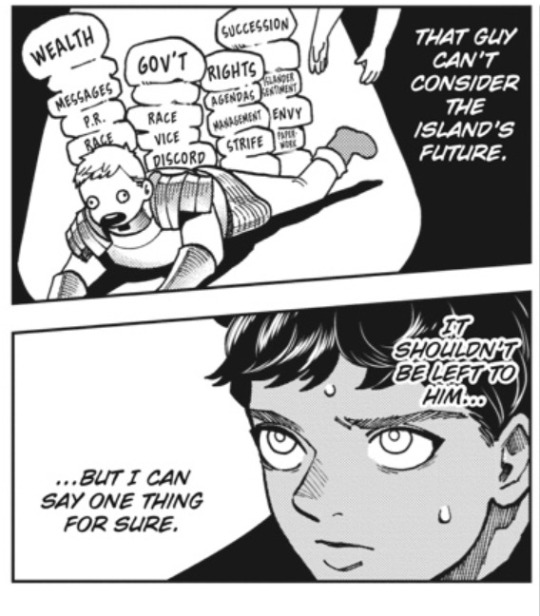
as an utayan, he understands that the tragedy that overcame his people was not random, but resulted from elven negligence of a disenfranchised people. it is imperative for kabru to cement himself as a voice for otherwise voiceless people. in his story, he has no choice but to handle the hero, if not become the hero himself.
kabru even has a story about his pursuit of laios, mainly that laios is currently the most capable person of defeating the mage and that he must do whatever it takes to ensure laios doesn’t fuck it up. his instincts are right, sure, but at first, he places special value in laios’ capabilities that almost seems unearned… like yes he’s studied the island adventurers with frightening expertise, so it makes sense he would have a good idea about who is the most equipped to succeed. but his early suspicions of the toudens seems to complicate my perception of his knowledge by adding emotional depth and a layer of tinhattery so to speak.
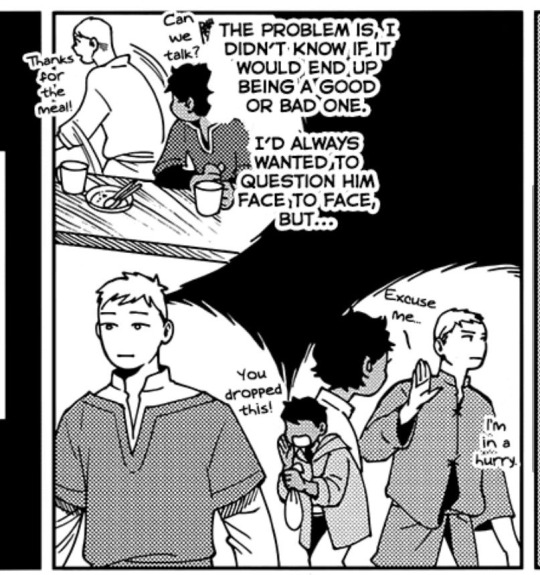
canonically, kabru has been rebuffed by laios multiple times (which is so... lolll) when he's talking with his party, kabru hides behind the excuse of dungeon but he’s been trying to get his attention this whole time. to me it reads like he's got a bruised ego from being ignored and is being a hater about it (so real lol). it's funny bc kabru is usually great at taking shit from others (esp elves) if it means nobody suspects/interrogates his true intentions and he can keep the peace. so why does laios tick him off so bad? now we have to get into the psychoanalysis of it all!
kabru is a cynic
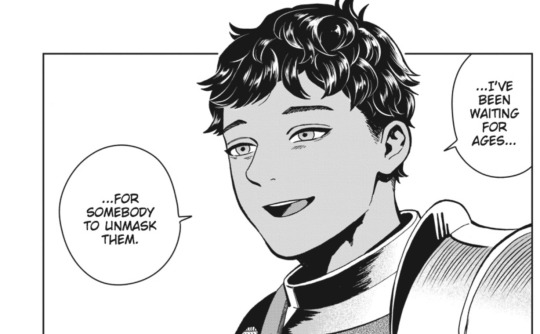
first and foremost, kabru’s cynical philosophy about humans is challenged by the touden mission. but plenty of people don’t care about the impact of their actions, so why does kabru obsess over the toudens at the start? I figured kui changed gears with kabru's characterization following his introduction, but I want to try to connect it to kabru's unresolved survivor's guilt. kabru is the sole survivor of a catastrophe caused by negligence and oversight. he criticizes the negative impact of the toudens' generosity and naïveté and confirms his cynical worldview (the road to hell is paved with best intentions), but still maintains a level-headed perspective. on the other hand, kabru's interactions with laios are tinged with irrational jealousy/resentment/desperation, even prior to kabru learning laios' character/intentions as an adventurer. I cannot emphasize enough that I am employing a neutral definition of jealousy here--it seems kabru is jealous of the freedom to not care the way laios does not care about the fate of the island. this isn't to say laios doesn't care about humans, he does, but he seems so singleminded compared to kabru esp in ch 76. kabru sees laios going to the literal end of the world to save his sister. laios gets to be human selfishly, kind-natured but ultimately self-prioritizing.
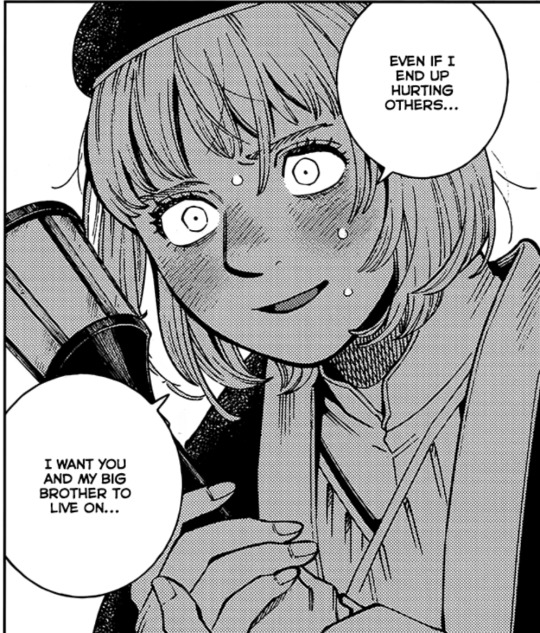
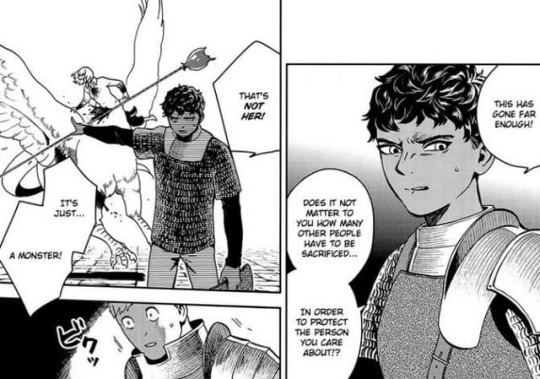
kabru correctly assesses motives (besides his own maybe). falin said she’d do anything to protect laios and marcille. laios has been socially rejected by people his whole life, and at first, he only cares about his sister and monsters. kabru has survived horror but only by accident… he doesn't agree with their pov and more importantly, it doesn’t exactly compute with him. the toudens are wholly unaware of their impact, which does not sit well with kabru at all, who understands the impact of negligence better than anyone else, esp how it ends up harming the less fortunate and extremely marginalized in society. it's reminiscent of the age-old trolley problem. while kabru has been the victim of senseless pain, I suspect kabru can’t yet make sense of senseless love. he gets to look down at their cause and call it selfish because it directly contradicts his lived experience.
kabru is an ethicist with a heroic streak
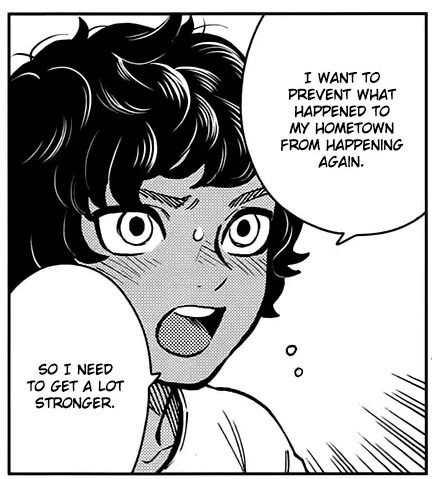
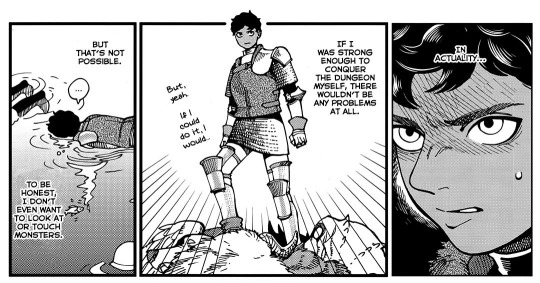
it's easy to glean that kabru wants to be the hero utaya should’ve had. while he's hardcore and intense, but not paranoid enough to do something rash. he uses violence as a means of achieving peace. he's self-aware enough to know his skill limits, which seems rational at a glance but the pressure he puts on himself suggests he views himself as inadequate until he achieves his goal. the races of humans are so split up and he sees that this is a matter of power first and foremost.
with the canaries, kabru submits to political pageantry to make a separate case for innocent people. senseless tragedy is unforgivable, but so is the "too little too late" reality of the canary system. he takes on the impossible task of rallying people together to save the dungeon. one read is that he's saving his childhood self from trauma perhaps by saving those like him… he's wishing someone did something before it got bad, wondering why nobody intervened when they had every opportunity to step in. it’s deeper than a sense of duty or fairness, this is about betrayal and retribution.
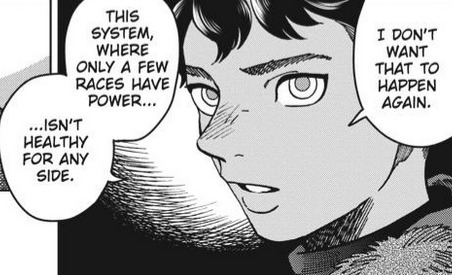
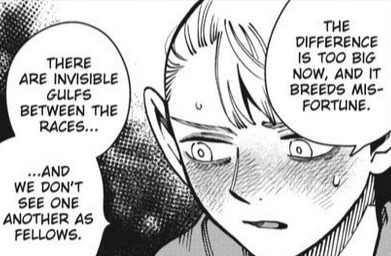
throughout his life, kabru struggles with the material inequity and limits of love. the human population is fundamentally segmented into a hierarchy due to lifespans and access to power/resources. his mother was the only one who loved him in utaya and she was ostracized because of his appearance and then she was killed due to senseless tragedy. his frustration with the elves encapsulates this idea perfectly, because he is aware of of the limits of their empathy as a long-lived race and adjusts his strategy and rhetoric accordingly. I think milsiril’s love for kabru is genuine, but still infantilizing and smothering due to the racial imbalance. this continues to inform his politics, as he views their perception of short-lived races with contempt. the worst offense is that their bigotry is nonsensical, meaning their hearts cannot be reasoned with.
dungeon meshi is a story about power and politics, yes, but genuine love and acceptance are the catalysts of change and equality. the "invisible gulf" that marcille is referring to is the inability to view other races with love and care. such is the essence of camaraderie. kabru's backstory, family history, and beliefs/motivations raise two important questions for me: who gets to be loved enough to survive, and then to thrive?
kabru is a monster
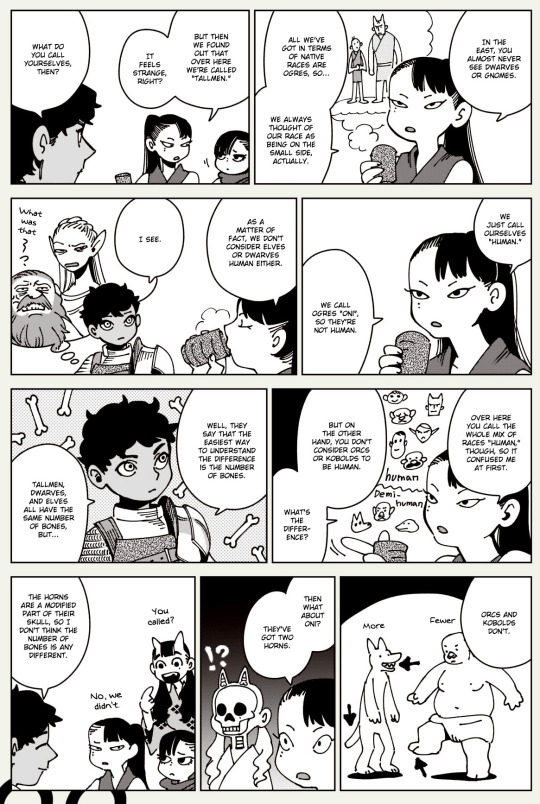
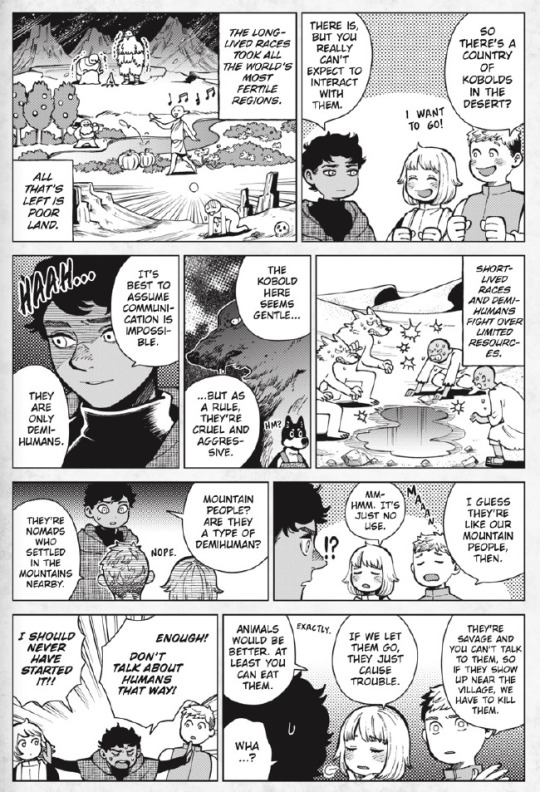
the emphasis on distinguishing between humans and monsters is quite interesting too. of all sentient beings, who qualifies as worthy of "human" treatment? who deserves empathy and acceptance? kabru seeks these answers to fix the world, but also to justify his place in it.
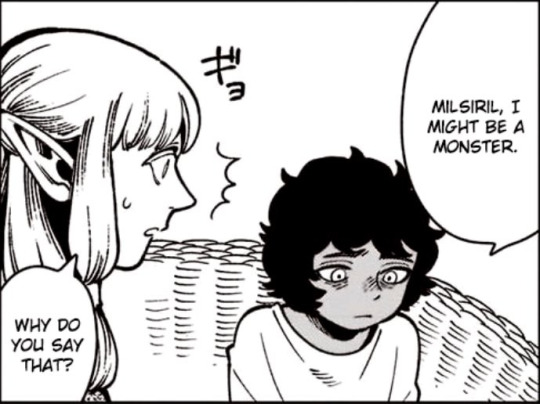
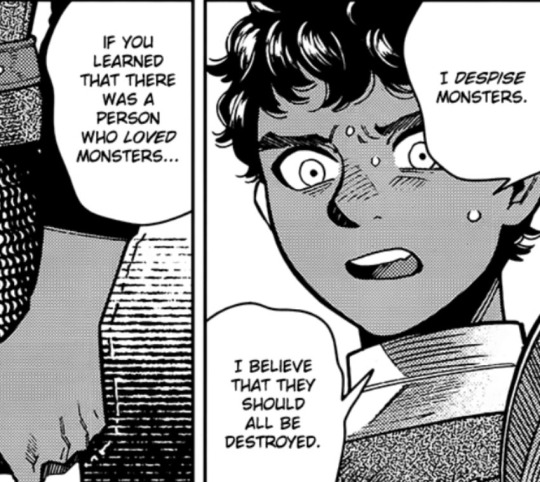
kabru's lack of self-worth is evident here, but what’s more interesting is he knows many humans suffer worse fates than some monsters. the dehumanization/neglect of fellow humans does not compute, if the premise is humans are superior to demi-humans/non-humans because mutual empathy and understanding. he clings to the superiority of humanity as an appeal to ethos to those in power despite what he might actually believe about himself. to kabru, the true injustice is that humans won’t even save “inferior” humans despite being the same. his unclear heritage manifests as guilt, as he feels directly responsible for his mother's suffering because he is monstrous. then here comes laios, a human who somehow can find it in himself to love monsters.
kabru doesn’t want laios to love him, per se, but laios’ love for monsters and for falin reveals life-altering possibilities for kabru: there is a world where someone could love him even if he were a monster. there is a world where somebody would go to extreme measures just to save him. kabru does not know the extent of laios' trauma but recognizes a sort of kindred spirit but inverse. taking off the ship goggles here--it has less to do with laios specifically, and more to do with what his beliefs/abilities represent for the trajectory of the world (because kabru studies how beliefs/abilities manifest into material reality, after all)
kabru is seeking the power of love
in a different story, kabru would be laios’ archnemesis. they would have a disastrous battle of opposing worldviews in their struggle for dominion. kabru has every right to want to take laios out bc while his affinity for monsters is sympathetic and even charming, it is still a natural threat… kabru has the true hero pathology. he believes he only deserves to live if he can save people for a variety of reasons/traumas. he should do whatever it takes to exterminate laios. but the expectation is subverted in chapter 76 bc we see kabru’s curiosity and ongoing quest for understanding win over his worst fears.
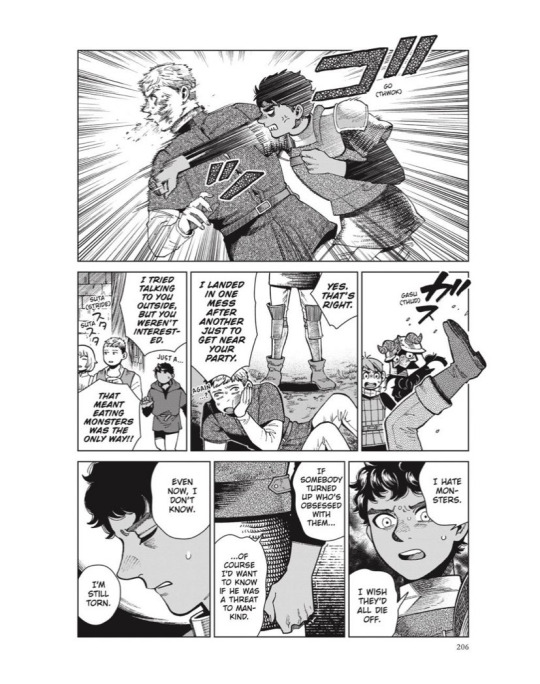
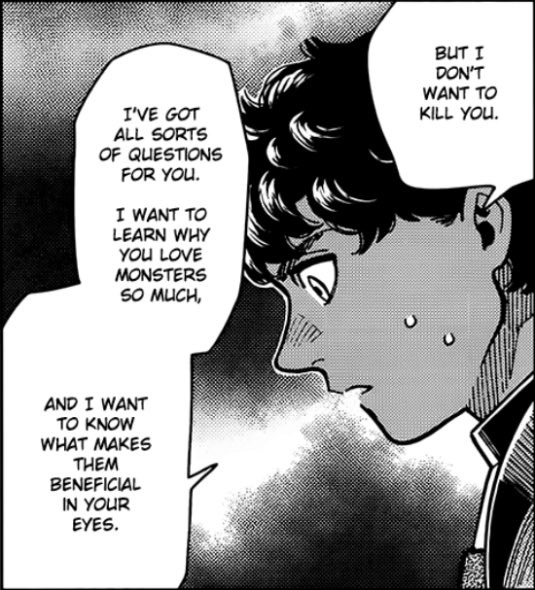
I feel like I’ve been projecting a lot but bear with me... a huge part of kabru’s character is him trying to figure out how to matter to people, or figuring out why people matter to others in general. it’s not to say he doesn’t matter to his friends or milsiril, but why else would he bother with all the manipulative people-pleasing? it would be less meaningful if he had ulterior motives like greed or power, but he plays into people's expectations/desires for a disastrously noble cause. he’s still actively living in his trauma as a deeply traumatized adult. it’s pure serendipity that laios can send him right back to his past and then pull him right out again. I don't think it's crazy to say kabru (correctly) projects a lot of shit on laios bc he doesn’t know how to deal with those injustices and barriers between people himself.
this is also why I believe kabru's beef with laios is as personal as it is strategic. we have to consider the trajectories of their character arcs (their big missions, respectively) in relation to one another as foils. if laios' love for falin can move mountains and do impossible things, kabru is subconsciously drawn to the magnitude of that love like a magnet. his response to cognitive dissonance is quite remarkable as well. at the root of his unbelievable capacity for understanding and curiosity is the deep wound of being unloved and unprotected. kabru does not avoid or run away from his fears, he quite literally keeps running toward them and follows it down to hell. he wants to identify the true source of his deepest wound.
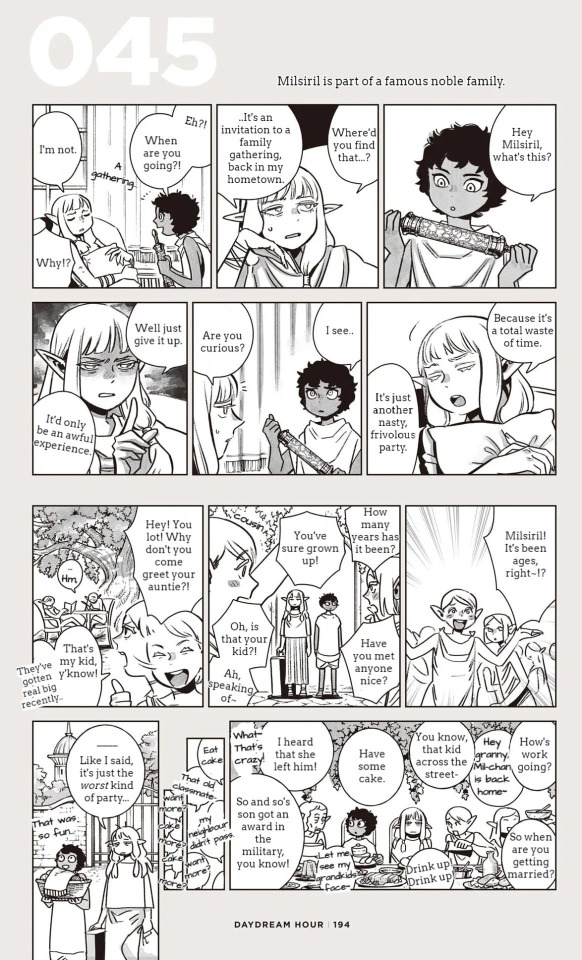
to me, this omake connects his childhood curiosity to his search for love, almost as to ask “is there enough room for me to be loved?" and the same can be said for marcille's character arc/ backstory. her biracial heritage has caused her great existential pain and social isolation.
in dungeon meshi, the issues of protection and justice continue to be interpreted through love. if kabru were to go back in time and save utaya, he would’ve needed incomprehensible magic, a supernatural power to save himself, his mother, his hometown. in contrast, laios' mission to save falin is just one manifestation of the surreality of love, all of the impossibilities it permits. the touden party wade through invisible gulfs to save falin, but also each other. kabru doesn’t hate their story, he just can’t fathom it yet.
kabru is a skilled strategist and communicator. and does not listen to his heart or body until he’s absolutely forced to do it. he has insane goals and expectations for himself and will go to great measures for those goals. as cerebral and cold as he might seem, it’s critical to understand that his character arc is about love too. in my opinion, it’s almost as if he’s trying to change his reality in hopes of finding love. my favorite thing about kabru is that he has all the narrative makings of the perfect misunderstood villain who self-destructs at the end of the story. but kabru is too smart for that, too focused on the big-picture impacts and the historical trajectory of the cause. instead, kabru finds the wherewithal to stand down once he understands that laios is capable of loving humanity like he does, or that he could help him see the value in humanity at all.
to love is to understand, and then to surrender.
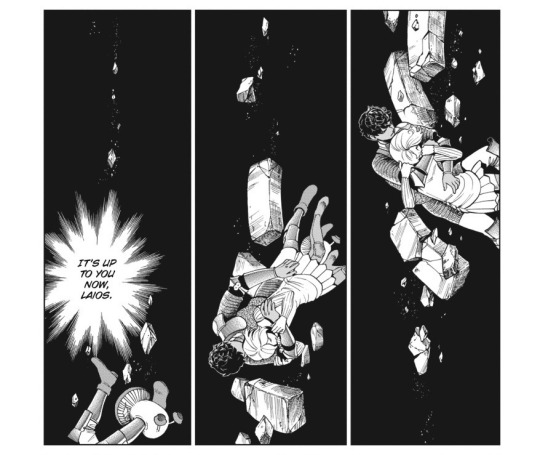
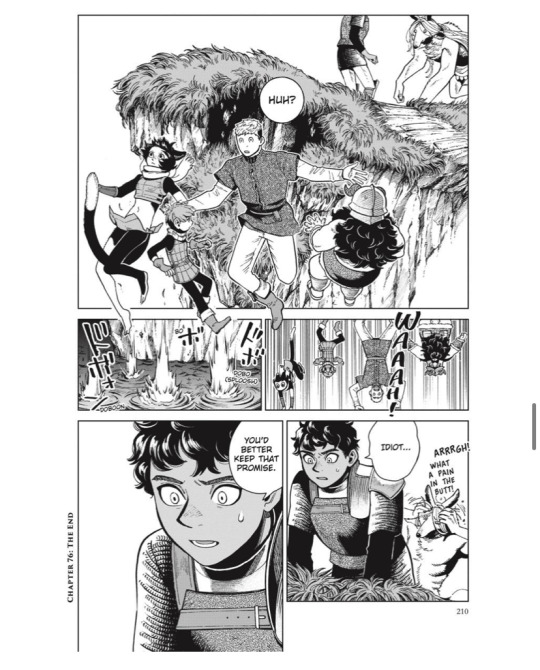
#dungeon meshi#kabru#kabruganda#labru#dungeon meshi meta#long post#dungeon meshi spoilers#hits post and runs away#unfortunately everything is about love to me#mine
1K notes
·
View notes
Text
Disney's unconventional "Cinderella" (1950) (long)
Having watched most of the many adaptations of Cinderella, I've come to realize what a unique adaptation Disney's 1950 animated classic really is. Unlike Snow White, which only had a few stage and screen adaptations before Disney produced its groundbreaking film, Cinderella had already been adapted many times before Disney's turn came, and Disney's version makes a surprising number of departures from the standard Cinderella "formula." It was definitely a fresh, creative Cinderella when it made its debut, and it arguably still is. Yet because it's become so familiar in pop culture, and today so often serves as our childhood introduction to the tale, it's easy to overlook its inventive storytelling choices. The 2015 live action remake uses several classic Cinderella adaptation tropes that the original 1950 film actually subverts!
Here's a list of the often-overlooked ways in which Disney's Cinderella stands out from earlier adaptations, and from many later ones too.
Cinderella herself. Disney's Cinderella isn't a traditional Cinderella in personality. The "traditional" portrayal of Cinderella, seen in virtually every adaptation before Disney's and several afterwards too, is the portrayal I call "The Waif": a very young, fragile, melancholy girl, dressed in pathetic rags and smudged with ashes, who makes the audience want to rescue her and who wins the Prince's heart with her wide-eyed innocence and artless charm. But whether chiefly to set her apart from earlier screen Cinderellas or from Disney's earlier delicate ingenue Snow White, Disney's Cinderella is none of those things. She comes across as older, or at least more sophisticated. Nor is she waif-like, but instead combines down-to-earth warmth with ladylike dignity, even at her lowliest. She doesn't sit in the ashes ("Cinderella" is her real name in this version), and her servants' dress is humble yet clean and only slightly tattered. She's gentle and kind, yes, but also intelligent, practical, playful, sometimes sarcastic, philosophical, optimistic, genuinely cheerful when she's with her animal friends, and yet angrier and stronger-willed than virtually all earlier Cinderellas. She doesn't beg to go to the ball, but asserts her right to go, and then sets to work fixing up an old dress of her mother's for herself. Only her stepfamily's sabotage, first by keeping her too busy to finish the dress, and then by destroying it after the mice and birds finish it for her, prevents her from taking herself to the ball without a Fairy Godmother. To this day, she stands out as a complex, unique Cinderella, which pop culture too often forgets.
Lady Tremaine. Some critics today complain that Disney makes Cinderella's stepmother a total monster instead of giving her "nuance" and call her portrayal "sexist." But can't we agree that her sheer cruelty enhances the film's dramatic power? And compared to earlier portrayals of Cinderella's Stepmother, it definitely makes her stand out. In most pre-Disney Cinderellas and many after, the Stepmother is a pompous, vain comic antagonist. Once again, Disney was innovative by portraying Lady Tremaine as a dignified, manipulative, and truly sinister villain, who takes quietly sadistic pleasure in abusing Cinderella and will stop at nothing to prevent her from going to the ball or marrying the Prince. As far as I know, she's also the first Stepmother to realize before the slipper-fitting that Cinderella was the lady at the ball and to take action to prevent her from being found. That's a commonplace plot device in more recent adaptations, but in 1950 it was a creative twist!
The mice and other animals. Viewers debate whether Cinderella's mouse friends, Jaq, Gus, et al, and their misadventures evading Lucifer the Cat are a welcome addition or take away too much screen time from Cinderella herself. But there's no denying that the presence of the mice and birds is an inventive storytelling choice, which makes Disney's Cinderella stand out! And I can provide a long list of reasons why they're more than just "filler." (1) They add liveliness, humor, and appeal for younger children. (2) They gave the animators an outlet for the type of character animation they did best, rather than binding them to the harder work of animating realistic humans. (3) They give Cinderella someone to talk to besides her stepfamily. (4) They give her a way to demonstrate her kindness. (5) The struggles of the mice with Lucifer parallel Cinderella's abuse by her stepfamily, and Cinderella's undying optimism not only keeps her from despair, but inspires them too. (6) They arguably provide a further reason why Cinderella stays with her stepfamily – not only does she have nowhere to go, but an entire community of small sentient creatures relies on her for food and protection. (7) They reward Cinderella for her kindness. From the start, her friendship with the mice and birds makes her life easier to bear, both by easing her loneliness and because they do helpful deeds for her, like mending and cleaning her clothes. They fix up her mother's dress for her to wear to the ball – only the stepfamily's last-minute cruelty requires the Fairy Godmother to step in. And in the end, they're directly responsible for Cinderella's happy ending by freeing her from her locked room. They do all these things because Cinderella has protected them, fed them, made them clothes, and been their friend. Therefore, Cinderella's good fortune never feels "just handed" to her: her kindness directly earns it.
The Fairy Godmother. It's always varied between illustrators whether Cinderella's Fairy Godmother is portrayed as a grandmotherly old woman or as youthful, regal, and beautiful, but screen and stage adaptations before the Disney version virtually always took the "youthful, regal, beautiful" approach. That is, when they didn't change her into a wise, fatherly male magician-advisor, as in several opera adaptations! At any rate, seriousness and dignity were the norm for this character in most adaptations from the 19th century through the 1940s. Making her a sweet, comforting, grandmotherly figure, with a comically and adorably absent mind, was another of Disney's fresh choices.
Cinderella's entrance at the ball. We all know the classic image of Cinderella's entrance from other adaptations. Cinderella appears at the top of the grand staircase that leads down to the ballroom, and a hush falls over the assembly, as not only the Prince, but all the guests and members of the court are amazed by the unknown lady's beauty and magnificent dress. Even in versions without a staircase, Cinderella captivates the room the moment she enters. Adaptations both before and after Disney's, including Disney's own 2015 live action remake, play her entrance this way. But the 1950 animated classic subverts it! The grand staircase leads up to the ballroom, not down to it, and Cinderella's entrance isn't a triumph at first, but a vulnerable moment as she makes her way up the stairs alone, dwarfed by the splendor around her. Then, when she reaches the ballroom, no one notices her at first, because the other ladies are being presented to the Prince and all eyes are on him. But then the Prince notices her in the shadowy background as she quietly marvels at her surroundings, and leaves his post to approach her and invite her to dance. Only then does the rest of the assembly notice her, because she's the one the Prince has singled out. It's more understated and it feels more realistic than the traditional entrance, as well as more clearly symbolic of Cinderella's venturing above her station, then both literally and figuratively being led out of the shadows by the Prince's unexpected attention.
The slipper-fitting plan. Over the years, it's been fairly popular to mock the idea of using the glass slipper to find the Prince's love, as if there were no chance it would fit anyone else. Disney's version is creative by having the slipper-fitting search be the comical, hot-blooded King's idea, not the Prince's, and making it clear that it's not, nor is it meant to be, a foolproof plan to find Cinderella. The Duke points out that the slipper could fit any number of girls, but the King doesn't care if they find the right girl or not: he just wants to hold his son to his pledge to marry "the girl who fits this slipper" and force him to marry the first one who fits it. This also means that Disney doesn't do what most adaptations do and have the Prince conduct the search himself, but follows the original Perrault tale by having a gentleman, in this case the Grand Duke, do it instead. This prevents audiences from mocking the Prince for relying on the slipper instead of knowing his beloved's face.
Cinderella breaking free and asking to try on the slipper. Even though in Perrault's original tale, Cinderella asks to try on the slipper, she almost never does in adaptations. In most versions other than Disney's, including Disney's own 2015 remake, Cinderella's presence in the house (and/or the fact that she has the other slipper) is either discovered by accident or revealed by Cinderella's allies, not by Cinderella's own initiative. In some versions, she even tries to hide from the Prince and/or the search party, either out of fear of her stepfamily or because she feels unworthy of the Prince in her rags. But not Disney's animated Cinderella! First of all, she has an assertive emotional breakthrough when she calls on her dog Bruno to chase Lucifer away and free Gus to slip her the key to her locked room. Earlier on, she urges Bruno to try to get along with Lucifer, lest the stepfamily not allow him to sleep in the house – it's clear that Bruno represents her own rebellious side, and in that scene she's really talking about herself, revealing that she tolerates her stepfamily's abuse so she won't lose her own "nice warm bed" and be homeless. But in the climactic scene, when she finally sees a way out, she gives up playing nice and seizes her chance. First she unleashes Bruno on Lucifer, and then she runs downstairs and directly asks to try on the slipper, not caring how her stepfamily will react, or what the Grand Duke will think of her shabby dress, or whether the audience will accuse her of gold-digging or not. This isn't a common breakthrough in other Cinderella adaptations, but it fits perfectly (like a glass slipper, you might say) with the Disney Cinderella's stronger-willed and more self-assured characterization.
"I have the other slipper." We can probably all safely assume that when audiences first saw Disney's Cinderella in 1950, they all expected Cinderella to try on the glass slipper she lost, with her identity revealed by its perfect fit. They never would have expected Lady Tremaine to trip the footman and break the glass slipper... only for Cinderella to calmly reveal that she has the other one. It's yet another clever and unexpected twist, not seen in any other version. Not even Disney's own 2015 remake.
Disney's Cinderella deserves far more credit than it gets for being unique among the myriad versions of the tale, especially compared to the versions that came before it.
3K notes
·
View notes
Text
Disco Academia
Open Access academic works written about Disco Elysium:
Urban Shivers: Recoding Actual Space in Disco Elysium (2022) by Arina R. Medvedeva
Baltic Screen Media Review Volume 9 (2021): Issue 1 (December 2021) - This entire issue is dedicated to works on DE, there are ten separate articles herein.
Not just Playing: Potential in Enhancing Second Language Learning through Games (2023) by Xiangyi Zhang
Screenshots as Photography in Gamescapes: An Annotated Psychogeography of Imaginary Places (2023) by Mafalda Gamboa et al.
Potentially paywalled articles, check if you have access through your local library or other sources.
The Voices of Game Worlds: A Sociolinguistic Analysis of Disco Elysium (2022) by Jens Kjeldgaard-Christiansen and Míša Hejná
Disco Pinball: Declining Games and Depression in Disco Elysium (2024) by Ryan Banfi
Our Bodies, Our Incoherent Selves: Games and Shifting Concepts of Identity and Narrative in Contemporary Storytelling (2018) by Julialicia Case
523 notes
·
View notes
Text
One thing I really like about Steven Universe is that it's deceptively efficient in its storytelling. Near as I can tell, nearly every superficially "episodic" episode in the first season (at least up to ocean gem, and quite a few besides that) is introducing a foundational building block of the setting, some mechanic, character trait, character dynamic et al that's gonna come back in a big way later, but a lot of them are camouflaged as genre-typical Wacky One-off Eleven Minute Adventures, and that camouflage only drops on a rewatch with knowledge of the greater context. Producing a skip-list is a fraught prospect- even the nominally non-canon Uncle Grandpa crossover (which was supposed to air before the season one finale) is used to introduce crucial information about how Steven's powers work!
905 notes
·
View notes
Text
“You may now become who you thought was disposable”: COVID-19 Politics and Ableism - Published July 4, 2024
Unpaywalled link available in the link to our archive! A taste below!
“You may now become who you thought was disposable”:
COVID-19 Politics and Ableism
Andrea Kitta
Journal of American Folklore, Volume 137, Number 545, Summer 2024,
pp. 321-330 (Article)
Published by American Folklore Society
For additional information about this article
muse.jhu.edu/article/931461[37.228.238.33] Project MUSE (2024-07-09 12:59 GMT) American Folklore Society
This essay critically examines the intersection of COVID-19, Long COVID, ableism, and health care disparities in the United States, emphasizing the transformative impact of COVID-19 as a mass disabling event with a disproportionate impact on marginalized communities. I also bring an autoethnographic lens to my experi-
ence of COVID-19 and Long COVID, underscoring the importance of recognizing the diverse and often untellable experiences of individuals with disabilities and challenging the prevailing ableist perspectives embedded in society. I raise ethical considerations of storytelling in the context of Long COVID and urge researchers to
embrace empathy and a more inclusive approach that challenges traditional notions of objectivity and distancing within academic research. I call for a collaborative approach between disability studies and folklore studies, encouraging scholars to interrogate and explore the traditions shaped by experiences of disability.
On December 13, 2020, disability advocate Imani Barbarin created a TikTok where she stated in the caption: “COVID is a mass disabling event. Things will never
be the same. Never. You may now become who you thought was disposable” (Barbarin 2020). Barbarin was not overstating what is happening in the United States. In addition to the overwhelming number of US-based COVID-19 deaths (1.07 million as of November 1, 2022, according to the New York Times COVID-19 Tracker [New
York Times 2023]), there is also an alarming number of cases of post-acute sequelae SARS-CoV-2 infection (PASC) or, as it’s more commonly known, Long COVID. Long COVID happens in anywhere from 5 percent to 50 percent of COVID-19 infections (although most medical experts agree the rate of Long COVID is somewhere around 20–30 percent of all infections). Long COVID affects women at a 22 percent higher rate than men (Sylvester et al. 2022:1391), and one study of Long COVID listed over 200 symptoms (Davis et al. 2021). The most common symptoms are fatigue, shortness of breath, cough, chest pain, brain fog, sleep disturbances, depression, joint pain, and dysautonomia (a dysfunction of the autonomic nervous system that typically
presents as the inability to control temperature, breathing issues, and other things the body normally controls automatically).
Current estimates of those affected by Long COVID in the United States are between twenty and forty million. COVID-19 has
also been shown to reactivate other viruses (Gold et al. 2021; Chen et al. 2022; Su et al. 2022), and one current theory is that Long COVID is the result of the COVID-19 virus continually being reactivated in the body (Klein et al. 2022). The latest research
out of Yale University shows that COVID-19 cases entail cellular changes to the B and T cells, lower levels of cortisol, and that the virus can reactivate other viruses (Su et al. 2022:891–2). A recent study with more than 154,068 participants showed that “in the post-acute phase of COVID-19, there was increased risk of an array of incident neurologic sequelae including ischemic and hemorrhagic stroke, cognition and memory disorders, peripheral nervous system disorders, episodic disorders (for example, migraine and seizures), extrapyramidal and movement disorders, men tal health disorders, musculoskeletal disorders, sensory disorders, Guillain–Barré syndrome, and encephalitis or encephalopathy” (Xu, Xie, and Al-Aly 2022:2406).
Both COVID-19 and Long COVID exposed inequities in the US health care system, with Black, Indigenous, and people of color (BIPOC) populations dying from COVID-19 at much higher rates than White people at the beginning of the pandemic. Compared to White people, Alaskan Indian or Alaskan Natives died at 2.1 times the rate, Black people at 1.7 times the rate, Hispanic or Latinx people at 1.8 the rate, and Asian Americans at 0.8 times the rate (CDC 2023). According to the Washington Post’s analysis of CDC’s statistics, the rate of White people dying from COVID-19
became equal to the rate of other groups beginning in October 2021, then (except for the Omicron wave) increased, primarily due to White people being unvaccinated. Strangely enough, the equalizing trend wasn’t because death rates dropped for BIPOC
people, but rather was due to the rise of the White death rate. Tasleem Padamsee, Assistant Professor at The Ohio State University who researched vaccine use and who is a member of the Ohio Department of Health’s work group on health equity, stated:
“Usually, when we say a health disparity is disappearing, what we mean is that . . . the worse-off group is getting better. . . . We don’t usually mean that the group that had a systematic advantage got worse” (quoted in Johnson and Keating 2022).
Additionally, at the time of this writing in Spring 2023, the pandemic has been declared as “over” despite the fact that around 400 people are still dying per day in the United States and that those dying tend to be people with disabilities and the
elderly (New York Times 2023). It’s difficult to imagine a situation where 400 deaths a day are deemed acceptable, yet here we are. Many people are desperate to “get back to normal” and seem to care more about going maskless or dining indoors than they do about those who are dying of COVID-19. Those who are unvaccinated and unmasked also seem to not understand (or not care) that the longer they continue on that path, the longer the pandemic will take to dissipate. Simply put, the majority
of people do not seem to care about people with disabilities, including those who are immunocompromised, and their increased health risks due to the pandemic.
People with disabilities are an unrecognized health disparity population, and they died at much higher rates during COVID-19 (Krahn, Walker, and Correa-de-Araujo 2015). The National Council on Disability found that 181,000 people with disabilities in long-term care facilities died from COVID-19 in the first year of the pandemic, making up one-third of COVID-19 deaths at that time (National Council of Disabilities 2021). The report is worth quoting at length.
In addition to disproportionate fatalities, key findings of the report include:
People with disabilities faced a high risk of being triaged out of COVID-19 treatment
when hospital beds, supplies, and personnel were scarce; were denied the use of their
personal ventilator devices after admission to a hospital; and at times, were denied the
assistance of critical support persons during hospital stays. Informal and formal Crisis
Standards of Care (CSC), pronouncements that guided the provision of scarce health
care resources in surge situations, targeted people with certain disabilities for denial of
care (National Council of Disabilities 2021).
Students with disabilities were denied necessary educational services and supports during
the pandemic and have experienced disruption and regression in their behavioral and
educational goals (National Council of Disabilities 2021).
The growing shortage of direct care workers in existence prior to the pandemic became
worse during the pandemic. Many such workers, who are women of color earning less
than a living wage and lacking health benefits, left their positions for fear of contracting
and spreading the virus, leaving people with disabilities and their caregivers without
aid and some at risk of losing their independence or being institutionalized (National
Council of Disabilities 2021).
Deaf, Hard of Hearing, Deaf-Blind, and Blind persons faced a profound communication
gulf as masks became commonplace, making lip-reading impossible and sign language
harder (National Council of Disabilities 2021).
#disability justice#disability politics#covid pandemic#covidー19#mask up#covid#pandemic#covid 19#coronavirus#wear a mask#sars cov 2#still coviding#public health#wear a respirator#ableism#covid eugenics
133 notes
·
View notes
Note
i don't know why you act so surprised that some people would be upset about how sooo many people in this fandom, you included, used to preach about how buddie was going canon, just trust the storytelling blah blah blah (sorry i always thought that was bullshit). and now you're like just kidding maybe it will be bucktommy forever instead. i'm not blaming you but really popular people in this fandom building up the idea for years that buddie was going to go canon and then just dropping that is absolutely part of what made this fandom go batshit don't play dumb about that
I'm not responsible for what other people think 🤷🏾♀️ I'm sorry that you appear to be unable to differentiate between me articulating my opinions on my blog versus me giving you targeted leadership about what you should think or believe, but I said in my pinned for years that I'm not your leader re: Buddie and it's not my job to "convince" you one way or the other. See pinned below:

Second, I'm going to be painfully blunt:
You gave me social capital. You, and everyone else who followed me and interacted with me, have made me a "really popular" blog. I have mixed feelings about that, both positive and negative, but we're here now and it is what it is. The problem you and I are having is that you made the mistake of believing that the social capital that you gave me made me an authority on all things 9-1-1.
It didn't. I'm not and I never claimed to be.
So you want to talk about the story? Yes, let's talk about the story. Per Oliver's own words, we as a fandom did interpret the story correctly. Oliver said in May that they (the higher ups) fished around the idea of Buck being bisexual in Season 4. Given this confirmation and, absent of any other love interests, it stands to reason that Buck and Eddie were supposed to be on a romantic trajectory, culminating in the events of Season 5 which is why Season 5 ended with me (because I can only speak for myself) fully believing Season 6 would be the season they finally got together.
Season 6 comes around. Not only do Buck and Eddie not get together, they also don't share many significant scenes with each other. Kristen was the full-time showrunner at the time, so I assumed she wanted to highlight the other dynamics on the show. This was also confirmed.

Season 7 comes around. Buck and Eddie share many significant scenes but none of them leave room to interpret explicit romantic intent the way some of their Season 3 / Season 4 / Season 5 scenes (in my opinion) have. Now, this is something we will likely disagree on because what I view as "romantic intent" is going to vastly differ from what you may view as romantic intent and that's fine. The gist is that none of the scenes Buck and Eddie shared this past season seemed geared toward explicitly pulling their relationship in a romantic direction.
Just the opposite, in fact. Enter Tommy.
I mentioned at the beginning of Season 7 that I didn't think Buck and Eddie were going canon this season. I said months ago that Tim et. al. were introducing the show to a new audience and that, what would be a slowburn for us, would be sudden for them. I said months ago that if, Buck and Eddie were to go canon, I didn't see it happening before Season 9 because they would need to build that relationship up for the audience. I still maintain that and, in fact, said in my personal DMs that whatever happens in Season 8 is going to be the determining factor for a lot of what happens in the future of the show.

So you want to talk about interpreting the story, trusting the story? That is what I am doing and, right now, the story seems to be veering away from romantic!Buddie. Does that mean they won't ever veer back? No! Does that mean I think Tommy is going to be Buck's endgame? No! What it does mean is that I'm leaving the door open on both fronts as a possibility. Which shouldn't be a shocking concept and yet is.
Third and finally, let's be clear, this betrayal you're articulating isn't directed at me or anyone else in the fandom. It's directed at Tim. You spent years getting your hopes up about a ship you're now not sure will come to fruition and that scares you. I feel genuine empathy about that because that's always such a shitty feeling and it's easier for you to direct your frustration and sadness and anger at targets that are more accessible because we're right here and, in this way, your emotions still have an outlet. But I'm not to blame for this uncertainty any more than any one else. I've not conducted myself perfectly in this fandom and I've owned up to it every single time. But in the conversation of what, exactly, drove this fandom to becoming "batshit insane," it's definitely those feelings of betrayal and uncertainty (which, for the record, I don't blame anyone for having).
Hope this helps.
tone: /not mad
43 notes
·
View notes
Note
this is not meant to start anything, I just want to get it off my chest: it really grinds my gears when people complain that Jacen Syndulla "isn't twi'lek enough". plenty of real life mixed race people only resemble one parent or resemble one much more strongly than the other and so only look like one side of their ancestry. complaining about how Jacen looks just feels like invalidating those people who are constantly told they "don't *look* x" when instead we could consider all the storytelling potential that can come from Jacen's relationship with his heritage and appearance. (not that I trust dave to do a good job but that's why we have fic)
You know what, that's fair. It's also fair to point out that we're not dealing with real world genetics, that design choices are deliberate in animation (and now live action), and that I don't think Filoni, Gilroy, or any of the other Rebels team were considering any of this when they designed Jacen, but also you're right that the way we talk about these things have echoes in the way we talk about real world things.
And it is often all too easy to slip into "this kid doesn't look enough like their parent, that's weird and bad" when, like, even if this is fiction, that can feel pretty bad for a mixed race person who has probably heard that exact sentiment applied to them in real life. And god knows I wouldn't complain about that to a real person, so I can tone it down for a fictional character because those real people might be reading my words.
So, I apologize for contributing to that and I'll keep it in mind going forward, to reframe it in my mind as a chance to explore what it might be like for Jacen to have a complicated relationship with his heritage and appearance that's not just about Force stuff. Because, you know, the more I think about it, the more I'm kind of really intrigued what that must be like for Jacen, we don't see a lot of mixed characters in Star Wars that are deliberately created as mixed, so what must it be like for him, to look so unlike his mother, or even what it must be like with him and Cham, who is so heavily into Twi'lek matters, what must it be like for Jacen to look at the art of his ancestors and see their additions to the Kalikori, and have such a complicated relationship with it?
Maybe Felony et al. haven't always earned that consideration, but the real people who might feel this hits too close to home do deserve our consideration and we could all always stand to strive for a bit more understanding and consideration.
148 notes
·
View notes
Text
You like reading fanfics? How about reading about fanfics? 😏
Here’s what I've read so far (or am currently getting through) for my dissertation on fanfiction bookbinding! I'll be updating it as I go until the end of July. If you have any recs to add to the towering pile or any questions/opinions about something on there, I’m all ears!
on fan studies & ficbinding ✔
Alexander, Julia, ‘Making fanfiction beautiful enough for a bookshelf’, The Verge, 9 March 2021 <https://www.theverge.com/22311788/fanfiction-bookbinding-tiktok-diy-star-wars-harry-potter-twitter-fandom> [accessed 12 June 2024]
Buchsbaum, Shira Belén, ‘Binding fan fiction and reexamining book production models’, Transformative Works and Cultures, 37 (2022)
Dym, Brianna, and Casey Fiesler, ‘Ethical and privacy considerations for research using online fandom data’, Transformative Works and Cultures, 33 (2020)
Jenkins, Henry, Textual Pochers: Television Fans and Participatory Culture (New York: Routeledge, 1992)
Jenkins, Henry, ‘Transmedia Storytelling 101’, Pop Junctions, 21 March 2007 <http://henryjenkins.org/2007/03/transmedia_storytelling_101.html#sthash.gSETwxQX.dpuf> [accessed 12 June 2024]
Hellekson, Karen, ‘Making Use Of: The Gift, Commerce, and Fans’, Cinema Journal, 54, no. 3 (2015), 125–131
Kennedy, Kimberly, ‘Fan binding as a method of fan work preservation’, Transformative Works and Cultures, 37 (2022)
Minkel, Elizabeth, ‘Before “Fans,” There Were “Kranks,” “Longhairs,” and “Lions”: How Do Fandom Gain Their Names?’, Atlas Obscura, 30 May 2024 <https://www.atlasobscura.com/articles/fandom-names> [accessed 12 June 2024]
Penley, Constance, Nasa / Trek: Popular Science and Sex in America (London: Verso, 1997)
Price, Ludi, ‘Fanfiction, Self-Publishing, and the Materiality of the Book: A Fan Writer’s Autoethnography’, Humanities, 11, no. 100 (2022), 1–20
Schiller, Melanie, ‘Transmedia Storytelling: New Practices and Audiences’, in Stories: Screen Narrative in the Digital Era, ed. by Ian Christie and Annie van den Oever (Amsterdam: Amsterdam University Press, 2018), 99–107
on folklore, the internet, other background reading ✔
Barthes, Roland, ‘La mort de l’auteur’ in Le Bruissement de la langue: Essais critiques IV (Paris: Éditions du Seuil, 1984)
Blank, Trevor J., Folklore and the Internet: Vernacular Expression in a Digital World (Logan, Utah: Utah State University Press, 2009)
Mauss, Marcel, ‘Essai sur le don. Forme et raison de l’échange dans les sociétés archaïques.’, L’année sociologique, 1923–1924; digital edition by Jean-Marie Tremblay, Les classiques des sciences sociales, 17 February 2002, <http://classiques.uqac.ca/classiques/mauss_marcel/socio_et_anthropo/2_essai_sur_le_don/essai_sur_le_don.html> [accessed 10 June 2024]
McCulloch, Gretchen, Because Internet: Understanding How Language is Changing (Random House, 2019)
Niles, John D., Homo Narrans: The Poetics and Anthropology of Oral Literature (University of Pennsylvania Press: Philadelphia, 1999)
hopefully coming up next (haven't started yet)
A Companion to Media Fandom and Fan Studies, ed. by Paul Booth (Hoboken: John Wiley & Sons, Inc., 2018)
A Fan Studies Primer: Method, Research, Ethics, ed. by Paul Booth and Rebecca Williams (Iowa City: University of Iowa Press, 2021)
Dietz, Laura, ‘Showing the scars: A short case study of de-enhancement of hypertext works for circulation via fan binding or Kindle Direct Publishing’, 34th ACM Conference on Hypertext and Social Media (HT ‘23), September 4–8, 2023, Rome Italy (ACM: New York, 2023)
Fathallah, Judith May, Fanfiction and the Author: How Fanfic Changes Popular Cultural Texts (Amsterdam: Amsterdam University Press, 2017)
Finn, Kavita Mudan, and Jessica McCall, ‘Exit, pursued by a fan: Shakespeare, Fandom, and the Lure of the Alternate Universe’, Critical Survey, 28, no. 2 (2016), 27–38
Hjorth, Larissa et al., eds. The Routledge Companion to Digital Ethnography (New York: Routledge Taylor & Francis Group, 2017)
Jacobs, Naomi, and JSA Lowe, ‘The Design of Printed Fanfiction: A Case Study of Down to Agincourt Fanbinding’, Proceedings from the Document Academy, 9, issue 1, article 5
Jenkins, Henry, Convergence Culture: Where Old and New Media Collide (New York: New York University Press, 2006)
Jenkins, Henry, Spreadable Media: Creating Value and Meaning In A Networked Culture (New York: New York University Press, 2013)
Kennedy, Kimberly, and Shira Buchsbaum, ‘Reframing Monetization: Compensatory Practices and Generating a Hybrid Economy in Fanbinding Commissions’, Humanities, 11, no. 67 (2022), 1–18
Kirby, Abby, ‘Examining Collaborative Fanfiction: New Practices in Hyperdiegesis and Poaching’, Humanities, 11, no. 87 (2002), 1–9
Kustritz, Anne, Identity, Community, and Sexuality in Slash Fan Fiction (New Work: Routeledge, 2024)
Lamerichs, Nicolle, Productive Fandom: Intermediality and Affecive Reception in Fan Cultures, (Amsterdam: Amsterdam Universtiy Press, 2018)
Popova, Milena, ‘Follow the trope: A digital (auto)ethnography for fan studies’, Transformative Works and Cultures, 33 (2020)
Rosenblatt, Betsy, and Rebecca Tushnet, ‘Transformative Works: Young Women’s Voices on Fandom and Fair Use’, in eGirls, eCitizens: Putting Technology, Theory and Policy into Dialogue with Girls’ and Young Women’s Voices, ed. by Jane Bailey and Valerie Steeves
Soller, Bettina, ‘Filing off the Serial Numbers: Fanfiction and its Adaptation to the Book Market’, in Adaptation in the Age of Media Convergence, ed. by Johannes Fehrle, Werner Schäfke-Zell (Amsterdam: Amsterdam University Press, 2019), 58–85
#fanbinding dissertation#fanbinding lit#bibliography#dissertation#reading list#gradblr#study blog#research#fanfiction#bookbinding#fanbinding#ficbinding#fanfic#ethnology#folklore#currently reading
43 notes
·
View notes
Text
I think there might be a documentary frame narrative for some of s3 just bc rolin et al r so thoughtful about how they put the show together, as well as the promos. I agree the promo content is not canon but I wonder if they might be teasing the format for next season's "interview". S1-2 unraveled all the complexity of "standard" audio-recorded interviews w Louis, armand, pre-vamp Daniel; maybe s3 tackles the video-recorded documentary, with Lestat and vamp Daniel. Maybe some others vamps too
Rolin et al could have called the show a few diff things -- Anne Rice's vampire chronicles, for ex -- but they chose to stick w/ "interview with the vampire". Obviously the famous movie having the same name helps w/ marketing but it's another sign that this show is always gonna b deeply concerned w the act of storytelling. What is true what is truth what does it mean to participate in ur own autobiography etc
Succession was so brilliant bc we never got flashbacks. Iwtv is so brilliant bc we get narrated, deeply biased, conflicting flashbacks; there is no omniscient "objective" pov to relay the "correct" version of events so in many ways u r still in the dark as the viewer, unraveling everything urself. (((Of course if u read the books u r one step ahead but zkkskssk ykwim)))
20 notes
·
View notes
Text
no but really I went into The Age of Arrogance thinking it was going to be yet another "badass FL gets with royal prince in order to topple the corrupt royal family and get the prince on the throne" story, which is fine in itself. Many such cases. Many such cases being good or at least compelling stories (I will live the life of the villainess; Angelic Lady; I'm the queen in this life; The Cup of Vengeance is in your hands; et al). (If you want to have a wider range and add grand dukes and other senior peers to the list of ML that help topple the corrupt reigning family, add Leveling Up my husband to the max, For My Derelict Favorite, Cierra, Remarried Empress kind of and probably where I abdicate my title as empress is going, and that's only the ones that aren't explicitly set in fantasy Japan/Korea! also that's only the ones I am reading myself)
BUT NO! THE AGE OF ARROGANCE IS BETTER!
It's a story about an action girl who had to take up arms or literally die and have her people be wiped out. She enjoys fighting now that it's less of a life or death situation but she doesn't enjoy war. She wants the good of her people. Her husband and her act like actual medieval lords, as in they manage the estate, make sure their people are fed and clothed and the roofs are repaired. That's already two things that are often enough cast aside (one for blind blood lust, the other for no management or the minimum) that I would enjoy it!
But then! Aha! In a world populated by stories in which the temple/religion/church are always corrupt and the bad guys, The Age of Arrogance manages to make clear that 1) their religion isn't bad 2) the heroes are pious too, at least offscreen 3) the priest who allied with the bad guys is an heretics that was disavowed by the Church he pretends to serve.
So on top of the rest, you're telling me we have nuanced storytelling about religion? But wait, there's more!
On top of that, the tough woman we have as a female lead struggles with intimacy despite slowly falling in love! We don't have instant lust, we don't have red chibi faces thinking "aaargh i want to kiss him so bad it hurts"! We have slow progression in the story of an already married couple (political marriage) learning to be with each other!
Anyway it's neat.
12 notes
·
View notes
Note
There’s been a few rumours that the Russos (and one of the writers from Infinity War/Endgame) may be coming back for Avengers 5/6! I’m curious about what those movies will be like, because they’re going to be even MORE crowded with a gazillion characters. 😅
And particularly, I wonder what the role of the Guardians is even gonna be in them… or at least Star-Lord, if no one actually has any plans to bring them back — which seems to be the most likely outcome. Personally, I wouldn’t actually mind too much if the new Guardians were brought back to join the final battle or something like that. It might be nice as a last hurrah for Rocket, maybe!
But what do you think? I know your opinions on those movies, so… I know what you have to say will be very interesting. 😁
oooooh boy. this just unlocked a whole bunch of competing thoughts in my head. i hope i can make sense of them enough to type them up.
here's the thing. i don't trust the russos or the IW/E writers but i am a person who (1) believes that people can grow and become better at damn near anything they want to, and (2) i am happy to be wrong. maybe the russos and whichever writer who is coming on board will have taken good lessons from the last five years since endgame (five years holy shit) and they'll come out stronger, better, more respectful storytellers. maybe they'll listen to other, better, more respectful storytellers on the team. hell, maybe disney will even let them be better (disney properties seem to be at their best when the mouse is least invested in controlling its indentured creatives). and of course, quality and effective storytelling won't only be on the shoulders of the russos et al. it will also be on the people who are working on the adjacent, intervening movies, and whether they are capable of and permitted to create compelling narratives and fully-developed characters along the way.
now, another thing i think will be tricky is if they choose to do another massive ensemble-battle (like the final endgame fight). i'm just not sure almost anything they can do will be actually satisfying to anyone who identifies with the characters who aren't the main focus. the reason that so-called "girl-power" moment in endgame was so fucken dissatisfying for so many of us was because it was unearned. condescending. you can't choose to feature so few of these women in the course of the whole movie, kill the only one of them with more than like three lines, and then throw every woman left alive into thirty seconds of battle choreography and think that your target-audience will see that as anything but patronizing. if the russos go for that level of sprawling battle-pageantry, that's what will happen, on some level. we just can't pay attention to every character the way they truly deserve when the cast is that massive.
and... i imagine this is exactly how the guardians would feature, if they aren't picked up by anyone in the meantime: one second of screentime in the background of a big fight, maybe with rocket's signature word as his new team advances to ultimately be lost in the ranks. or a singular star-lord, fighting on the side of the new avengers.
now, i'll let you in on a little and possibly controversial secret: i don't need more of rocket in the mcu. i think the mcu might fuck up a beautiful story. if they were to bring him back - unless it were a complete alternate timeline like a new cartoon - i almost think it would need to be a wholly different genre. here are the best ways i think disney could bring "mcu" rocket back:
fuck copaganda but brooklyn-99 had a distinctly guardians vibe in terms of a bunch of well-meaning dysfunctional idiots coming together under extremely exhausted but HIGHLY effective leadership. we could take this ride through space in a star-trek-esque adventure-of-the-week approach or base it in knowhere so we can really see what it looks like to be a guardian in that community, and meet some of the characters like xlomo smeth, ssssaralami, hoobtoe, the broker, HOWARD, etc.
mst3k but it's like, movie night on knowhere. they project some disney movie on the side of one of the bone-buildings and rocket and groot are always making commentary. but they're not the only ones. nebula's there, and for kid-appropriate movies drax and the kids are too. sometimes howard comes along and he and rocket get drunk and compete to be the harshest critic. adam tries to crack jokes sometimes but he's bad at it.
nebula and rocket during the snap. IN SPACE. mostly. i'll accept occasional visits to terra check in on thor. i suspect we see a lot of kraglin on the third quadrant and maybe spend some time helping with reconstruction in knowhere.
a super-ironic self-aware parody of some old sitcom like full house. i'm open to rocket being the father-figure and the new guardians being the chaotic fam, but i'd also be open to it focusing on the star children, calling it "drax the dad," and having rocket be the uncle-jesse-character. which brings me to my last option, which is
actually center the show around a singular someone else, like adam or phylla, and have rocket occasionally make an appearance as an important background character: a father-figure, a mentor, a captain, a guide, a beloved pain-in-the-ass. occasional conversations over the comms where he's like "are you eating enough? are you cleaning your cannons like i taught you? you still closing your eyes when you squeeze the trigger 'cause i told you to stop fuckin doing that. when are you coming home? nebula misses you and your brother is driving me fuckin crazy"
i do think there are other things that good writers could make work but these are the ones my heart rests on because i just don't trust disney/marvel very easily these days
WHICH IS ALL TO SAY
of course i'm gonna watch whatever disney/marvel puts out into theatres and/or on disney+, especially if the guardians are in it. and especially if my guy is in it.
but i'm also fully expecting to have my heart broken. ¯\_(ツ)_/¯
as i said, i'm a person who is happy to be wrong.
#rfh asks#mcsquared789#infinity war#endgame#endgame rants#mcu#marvel cinematic universe#guardians of the galaxy#rocket raccoon#marvel critique
14 notes
·
View notes
Note
32! Do you like HS^2?
i...genuinely do! i think sometimes there's a half-conception that based on the mere premise of my fics that i don't like postcanon all that much (omelette route was misconstrued as an epilogues fix-it fic in certain circles and pickle route is still sometimes seen as a "better version" of hs^2) even though everything i write is in direct conversation with and comes from a place of admiration for hs^2/the epilogues.
with hs^2 in particular i think it had some really electric ideas that we only got to see the very first brushstrokes of (thinking most pertinently here about whatever was going to go down on deltritus that we never saw) that, if they'd been able to get off the ground, probably would have eclipsed the epilogues as the most interesting part of homestuck. from the bits we saw the meat timeline stuff was definitely the weakest. outside of the jade/altcallie possession chapter a lot of that half of the story was fairly unsurprising character-driven extrapolation of the same angst we departed the epilogues with - and i largely agree with @hms-no-fun that some kind of timeskip here would have helped it feel a little less repetitive (although arguably there might have been? three years definitely passed with dirk et al but it was very up in the air as to how long it had been for the pursuit spaceship crew). i get why that never happened - both meat and candy were being told in tandem and candy ended on a buildup to an immediate conflict that needed to be followed in real time versus meat's meandering slingshot towards something more nebulous, so for the sake of structural symmetry that limited things a little.
i think i'm more amenable to a lot of hs^2's storytelling decisions because i wholly and entirely loved the epilogues from the getgo and it was so good to see that theme/tone be carried through to a more "traditional" mspa space, even if i wonder if the comic form damaged the story more than it helped it. i remember a lot of people getting weirdly mad whenever we'd get an extended prose scene instead of visual panels despite hs^2 being a continuation of the text-based epilogues. then again, the mainstream hs fandom as a whole fucking sucked when it came to postcanon and that's even more evident in how they've collectively memoryholed the whole thing so talking about audience reception is maybe not the most useful thing to talk about here lmao. idk i think people forget that homestuck is largely a story about people who suck and then who get better from sucking. it's just that nobody really likes it when that lens is turned inward onto the alphas/betas who outside of a small handful of exceptions in canon never really had any ethical issues that caused problems for them and others so i personally think it was very interesting and refreshing to explore how the kids' complacency wrt their baggage and trauma allowed them and their world to backslide so disastrously! roxy lalonde enabling jane's fascist ascension is fascinating storytelling actually! (side note: read through shadowed eyes)
hs^2's original characterwork is probably where the story shines the most. the fucked up dynamics between the theseus crew was super fun to read because there's honestly nothing more enjoyable than Supremely Divorced people deciding that makes them irredeemably evil now. the egbert gender stuff was really nice! i particularly enjoyed how, even though it came after the june egbert renaissance, it still managed to be its own unique take on egbert's gender arc that i think really encapsulated the originality driving the project. also forever shoutout to the candy kids my beloved candy kids my children who i will die for - for me in particular hs^2 was a fun time because i was developing my own versions of harry/vrissy/tav for pickle route in parallel to hs^2 and it was so enjoyable seeing all the overlaps and divergences with each upd8. also yiffy fucking rules on every level and even though she never got to be more than a promise she sure was one hell of a promise.
that said i do not think it's that surprising that hs^2 ultimately died before its time. the conditions of the story paired with the most demoralising and vicious iteration of the fandom meant the odds were stacked against it in a big way. you can particularly see the strain of that starting to manifest in the final ~6 months worth of upd8s where people were leaving/being pushed out of the project and every part of hs^2 was a completely hostile environment and the quality of the art and storytelling began to get a little shaky - which i can't really blame them for all things considered! it's hard to want to make the best version of a story possible when the overwhelming reception is a bunch of sanctimonious redditbrained weirdos screaming that you're evil and foul for making characters in a piece of fiction do unexpected and surprising things and also being sympathetic to trans women. there were of course issues with the production conditions of hs^2 that would have probably led to some sort of reckoning at some point, but it's very obvious that the traumatic pressure cooker of a fanbase that wanted nothing more than the death of this project and the ruination of everyone that worked on it threw this whole thing off the rails much faster. despite that, you still have to infinitely admire the team for daring to make something challenging and original in a sphere dominated by people who are content to regurgitate the same babybrained 2013 content ad infinitum - for just a brief moment, homestuck was truly allowed to be the literary masterpiece it's been all along. now people just treat it as more fandomslop to consume and that's perhaps the biggest shame of all.
in the end i think hs^2's legacy is best felt in the places haunted by its premature absence. i'm talking about the comic itself of course but also other spaces and people and projects. stuff that really engaged with the meaty thematic frameworks being thrown up in postcanon that now no longer have a mirror to talk back to - stuff like pesterquest and godfeels and the aforementioned through shadowed eyes that all massively are in conversation with the deeper artistic and philosophical principles underpinning this era of homestuck. if anything else hs^2 will continue to serve as a useful prerequisite for getting into some of the best stuff homestuck fans have ever made. we might never see what could have been, but at least the torch is still being carried by people who care.
#spaceengineerjulia#homestuck asks#homestuck^2#long post#i had more opinions on this than i'd previously thought lmao
98 notes
·
View notes
Note
Sorry to bother you but i have a question. I am still a bit confused about the whole World of darkness vs chronicles of darkness thing and is werewolf the apocalyse and 5th ed the same thing? And are they a part of chronicles of darkness? From what i understand CofD is a seperate reboot of the old WoD and actually trying to fix the issues with WoD classic, or am i mistaken about that and CofD isnt good either?
I love this question!
So, Chronicles of Darkness is actually pretty darn good! It does a ton of work to address systemic issues in the old literature, and as you think, it is indeed a setting a property separate of the World of Darkness on the whole. The first edition of Werewolf: the Forsaken wasn't great, but 2nd edition was really solid. The tribes, culture, mechanics and world meta are so different from legacy so as to be incompatible, and Storytellers Vault expressly forbids attempting to cross the two in terms of mechanics and factions (though displaying art across books is fine so long as it doesn't take faction logos.) it's an interesting ecosystem of boundaries that allow them to coexist in the same space but not the same game line.
5th edition shares the setting with the original World of Darkness and considers itself a reboot (sorta like the reboot of Jurassic Park, others, etc al to attract new players with new actors, dressed up familiar toys et al) and can be crossed because it's considered the same gameline as legacy WtA.
As for why I don't personally use CofD? The answer is simple. CofD gives you tools to build your own setting, world, and meta. WtA gives you a turnkey world meta, and WtA is what grabbed my autistic narrow interest as a queer teenager.
#world of darkness#werewolf: the apocalypse#werewolves#werewolf#wta#werewolf the essentials#w5#ask a storyteller#Mundus Artis
19 notes
·
View notes
Text
Newish Comics:
Batman #149: this tied off storytelling for a year very neatly. Things I'm optimistic about - it looks like Zdarsky is planning to get more into why Vandal Savage as Police Commissioner is a terrible idea after we get through Absolute Power.
I'm also actually interested in Pennyworth Manor (sorry to all the haters) in terms of several aspects: it's going to keep Bruce et al in a base in Gotham proper, rather than over in Bristol, which I do enjoy in terms of being 'part of the community'; and Bruce offering a home for EVERYONE to move in is actually new territory for main continuity. I think the previous record for Batfam actually living in the same home on panel is Dick, Tim and Damian (in the Penthouse during Reborn). Tim and Cass theoretically have an overlapping period in 2008-2009, Dick and Tim lived in the Manor together during Prodigal, but for most periods it's Bruce-and-one-kid at best.
Do I think it's WFAish? Yeah. But I think it creates opportunities for family storytelling and hopefully conflict in terms of ACTUALLY getting this family of only children having to interact regularly.
(also lol Jason didn't turn up)
Batman/Superman: World's Finest #28: I dunno. Maybe I've hit my fill on Silver Age silliness.
The Warlord #57: this week in Skartaris I am promised bondage. Thanks, Mike Grell!

A conspiracy has locked Travis up, and seduced Tara with her old boyfriend! They have someone impersonating Travis so that Tara doesn't realise anything's amiss (but replacement Travis doesn't understand how guns work).
I keep giggling at that spiked helmet. Oh no! The spikes!
Also Mr Definitely Not Fagin, I Said Darvin has his little band of streetkids guarding the prison that's holding Travis. Joshua disappears though off to go run around the streets, followed by one of the other kids, and we get this interaction.

Yeah. You totally aren't fraternising with royalty right at this very second, kid.
11 notes
·
View notes
Note
What is your take on Azula's relationship with Zuko? There's a lot of talk about her rivalry with him, but I find it more intriguing to talk about their other facets, like the implication that Azula deep down actually cares about her brother.
There's this odd phenomenon that's been happening in what I'll call ATLA fandom 2.0 (the post-netflix revival) where it seems like you have to pick a side- Zuko or Azula. If you stan one, you can't stan the other. And I haven't cared for that since, frankly, those two (alongside best girl Katara) are easily my favorite characters. So I'm not all that interested in "picking sides" and I'm not all that interested in them as rivals either. That said, it's important to note that their position in opposition to each other is important to the story the show is telling.
Azula is a character in her own right, but she's also a narrative device. As an antagonist, Azula is Zuko's most direct foil. She's his dark mirror, his evil twin (narratively speaking.) So when she's on top of the world, he's hit rock bottom, and vice versa. She represents the worst of the Fire Nation and is everything he could become if he were to give into his worst instincts (again, this is all speaking symbolically, their personalities are quite different). But because of this, she had to fall for him to rise. It's very effective storytelling within the three seasons of the show. Unfortunately that meant there wasn't much room within those three seasons to showcase any more nuance in their relationship.
I'm always torn on this decision by the showrunners, because on the one hand, it's a huge part of why Zuko's story arc is as effective as it is. And all my biases aside, Zuko's arc is very effective and, for a children's show released in 2005, pretty smartly written. It gets a bit overblown by the fandom, it's a pretty basic redemption arc at the end of the day, but it's still a well executed one and I think it's dishonest to pretend it isn't. On the other hand, it came at the cost of actually developing the relationship between Azula and Zuko and, arguably, of Azula's character as a whole. She isn't allowed to have her own arc independent of Zuko because she really only exists (from a writing standpoint) to be that dark mirror. She's not Aang et al's main antagonist. She's Zuko's. She doesn't really get to do much outside that role.
All that said I do think it goes without saying that Azula cares for Zuko. I think it also goes without saying that Zuko cares for Azula too, but he's ironically worse at expressing it (within the main series at least). Because of the way the show was written, however, none of this can be explored except in supplemental material or fanworks. And supplemental material has been...lacking, I think, in that department.
There's some awesome fanworks out there that explore their dynamic, though. I really do encourage people to go back into the archives and find stuff written years ago because stuff written at the time the show was airing/right when it ended are some of the best. The show hadn't yet been lionized as much and fandom opinions of the characters hadn't yet crystallized into what they are now (and also the comics and lok didn't exist so no one had to deal with that.)
23 notes
·
View notes